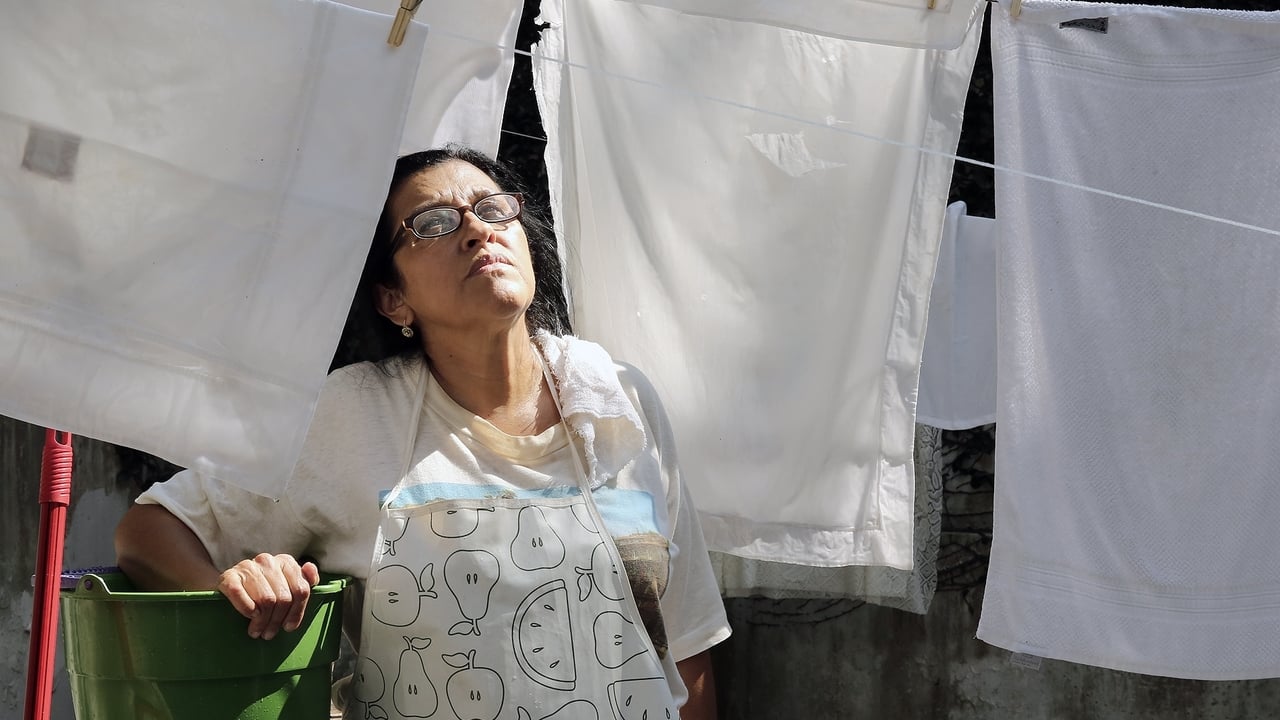alexrene-80054
Val is a housekeeper for a wealthy family in São Paulo Brazil. Despite being like "part of the family" and raising the family's son, Fabinho, as if he were her own son, Val has been separated from her own family for many years as she works to make money to support her daughter. When that daughter, Jessica, needs a place to stay while she studies for her entrance exam for a prestigious college in São Paulo, Val is all too eager to be reunited with the child she had to leave behind so many years ago. Val has been a live-in housekeeper/nanny for the family for years, and the issues begin when Jessica quickly shows that she has no respect for the unspoken rules that govern class within the household. The title of the film roughly translates to "When will she return?" and the theme of mothers separated from their children reappears throughout the film. Val and Jessica are not close because Jessica was raised by family while Val made money to support her. Fabinho and Dona Barbara are similarly estranged by her career. This film explores the dynamic and class boundaries within the household. Although Val considers herself part of the family, Jessica's disruptive presence quickly reveals that this is not quite the case. Val is also physically separated from the family, dwelling within her own domain in the kitchen and constantly eavesdropping on the conversations that take place in the dining room just through the open doorway. Que Horas Ela Volta? is hilarious, well-acted, and at times a little uncomfortable to watch. Val and Jessica may not disassemble class structure in Brazil, but the ridiculous and sometimes demeaning treatment that Val receives from Dona Barbara does cause the viewer to reject that treatment, which is a start.
dion-perry
This movie is based around a live-in servant Val and the three people she serves: the father, his daughter and her son. Despite living in the same house as her three masters, Val is very subservient and looked down upon. She does not swim in her master's pool, does not eat at the same table as them, nor does she eat the same food. Val's life is turned upside down when her daughter Jessica comes to stay in order to sit the university entrance exams; a university that is only for the elite. Despite her mother's insistence and pleading, Jessica refuses to conform to the role of servant's daughter with interesting consequences that are not stereotypical.The second mother is beautifully done. The acting is superb. The story is told elegantly showing not just the injustice of class, but presenting it for the ugly beast it is. What I particularly liked about it was that Jessica's role was not overdone and stereotyped. The character was not deliberately being antagonistic, she was simply being herself and that meant refusing to conform to class social norms. If you get the chance to see this film I urge you to do so.
mila61
Great film and beautifully played by the main characters. I believe this is not just a social problem in Brazil, this is happening every were, every day, we just don't see it or we prefer to ignore it, since we are living in a privileged world, this story should wake us up, it's profound and touching, after the arriving of Val daughter Jessica, something is suddenly wrong in "paradise", the jealousy of the biological, superficial Mother is obvious, she doesn't realize that if you won't to harvest love and affection, you have to sow first, a great lesson has been shown here, real happiness lies in giving and receiving meaning unconditional Love
Lucas Versantvoort
There have been many films about class relations: Renoir's La Règle du Jeu and so on. The best of the bunch manage to analyze class differences--and similarities--in intriguing ways. Que Horas Ela Volta? is one of those films.Val is a housemaid for an upper-class family in São Paulo. She lives miles away from her daughter Jéssica, but the job allows her to provide for her which lessens the pangs of guilt at least somewhat. Val actually lives in the residence, works very hard and in the thirteen years that pass, she forms a motherly bond with the son, Fabinho. His actual mother, Bárbara, is very career-oriented, you see, so you can see why he latches onto Val. We see how Val is simultaneously well off, but not truly respected. She presents Bárbara with a gift: a set of cups with a black/white color pattern. Bárbara acts as if she's pleasantly surprised and tells Val they'll save it for a special occasion. Well, the special occasion arrives, a party. Val brings out the cups, but Bárbara berates her, having already forgotten Val gifted them to her. Then one day, Val gets a call from Jéssica who's looking to participate in the admission exam at the University of São Paulo. She'd need a place to stay. Val, of course, immediately agrees, but what Jéssica doesn't know is that Val takes her work home with her, so to speak. It turns out that Jéssica is very confident and smart and it immediately becomes clear her presence will shake up this upper-class residence quite a bit.This being a film about class relations, it makes sense that this is the most stimulating aspect. It's funny to see this rich family's discomfort when the housemaid's daughter--of all people--appears more confident and smarter than Fabinho. Or note the similarities in expectations: Val works in almost slave-like fashion, but doesn't rebel, because she's been brought up with the notion that this is the way the world works. The rich family obviously holds similar opinions, otherwise they'd treat Val better. Another interesting thing to note is the role of the mother (the English title for the film is The Second Mother). Val hasn't been the mother to Jéssica she feels she should have been due to the literal distance between them. Then you've got Bárbara whose relationship with Fabinho is pretty much non-existent despite the fact they occupy the same living space.The film almost risks falling into the familiar trap of showing the lower class folks to be real human beings as opposed to the upper class scumbags whose morals and decency have slowly eroded over the years in the pursuit of the almighty dollar (or peso), etc. While Val and Jéssica - and thus the 'lower class' - ultimately triumph, the overall portrayal of these characters remains nuanced and believable.And that's how I'd describe the entire film: nuanced and believable. I do think Val's character development could've been paid more attention (particularly toward the end) and Jéssica could've been introduced a little sooner as that's when film really comes alive, but overall it's a good examination of class relations that doesn't get bogged down in melodrama.



 AD
AD




